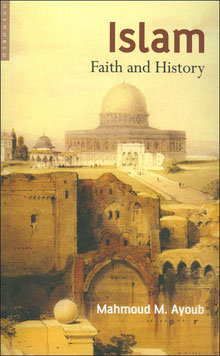Book Notes
 Mahmoud M. Ayoub, Islam: Faith and History (Oxford: Oneworld Publications, 2004), 242pp.
Mahmoud M. Ayoub, Islam: Faith and History (Oxford: Oneworld Publications, 2004), 242pp.
The 9/11 attack on the United States and subsequent wars in Afghanistan and Iraq, tragic as they are, have at least placed the Islamic world on the radars of westerners who up to now have given it scant attention. Mahmoud has written an introductory text accessible for a general audience; he assumes no knowledge of Islam on the part of the reader. His remarkable personal story certainly enriches his effort. Born to a poor and uneducated family in Lebanon, he eventually earned his PhD at Harvard, and today is Professor of Islamic Studies and Comparative Religion at Temple University in Philadelphia. By the time he was a year old he lost his sight, and as a consequence his mother enrolled him at a Presbyterian British Lebanese missionary school for the blind. He became a Christian there, and when he later found the Presbyterians insufficiently zealous he joined the Southern Baptists, then the Quakers when he was a student at the American University in Beirut, before returning full circle to embrace his Muslim heritage.
Mahmoud walks the reader through the basics of Islamic history, theology, and practice. He situates his interpretations within the larger social, economic, political, and military history of both pre- and post-Islamic Arabia (and to a lesser extent Asia and the other major domains of Islam). He does a good job of outlining the breadth of opinions and interpretations of Islam by Muslims—mainstream and extreme, traditionalist and reform movements, the admirable and the reprehensible, the ideal and the real. He identifies the Qur'anic sources of Islamic faith and practice, but shows how they have been shaped by various interpretations, social custom, and complex schools of jurisprudence. The advantage of this, of course, is that it helps the reader not to stereotype Islam with broad generalizations, but rather to appreciate its intricacies, diversity and complexity.
I would have appreciated a more extensive bibliography; the existing one only lists two dozen books, without annotation. Similarly, I would have enjoyed more interaction with secondary literature on important subjects like feminism. I kept wondering, for example, how he might have interacted with Azar Nafisi's Reading Lolita in Tehran, Jean Sasson's Princess (1992, 2001), Latifa's My Forbidden Face (2002), Harriett Logan's Unveiled: Voices of Women in Afghanistan, or Behind the Burqa by Sulima and Hala, Batya Swift Yasgur, along with films like Khandahar (2001) and Osama (2003). What insights might he offer on the role of global Islam, or the American invasion of Iraq? What "top ten" matters of Islam might he wish to tell Americans? Mahmoud's book, along with similar introductory texts like No God But God (2005) by Reza Aslan, or the several works by Bernard Lewis, are all fine places to begin to dispel our western ignorance and apathy about a religion that claims over a billion adherents today. Finally, for a good article on introductory texts to Islam, the Qur'an, Islam in political context, and contemporary efforts at reform, see Charles Kimball, "Reading Islam," in The Christian Century (May 17, 2005), pp. 44–52.


